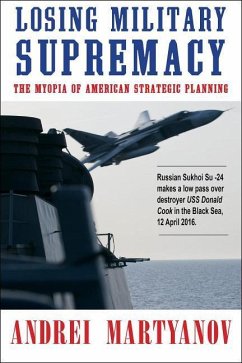While exceptionalism is not unique to America, the intensity of this conviction and its global ramifications are. This has led the US to grossly misinterpret--sometimes deliberately--the causative factors of key events of the past two centuries, reaching the wrong conclusions and learning very wrong lessons. Nowhere has this been more manifest than in American military thought and its actual application of military power. Time after time the American military has failed to match lofty declarations about its superiority, producing instead a mediocre record of military accomplishments. Starting from the Korean War the United States hasn't won a single war against a technologically inferior, but mentally tough enemy. The technological dimension of American "strategy" has completely overshadowed any concern with the social, cultural, operational and even tactical requirements of military (and political) conflict. With a new Cold War with Russia emerging, the United States enters a new period of geopolitical turbulence completely unprepared in any meaningful way--intellectually, economically, militarily or culturally--to face a reality which has been hidden for the last 70+ years behind a strategically-crafted delusion concerning Russia, whose history the US viewed through a Solzhenitsified caricature kept alive by the powerful neocon lobby, which still today dominates US policy makers' minds. In Losing Military Supremacy: The Myopia of American Strategic Planning, Andrei Martyanov: - explores the dramatic difference between the Russian and US approach to warfare across the whole spectrum of activities from art and the economy, to the respective national cultures; - addresses Russia's new and elevated capacities in the areas of traditional warfare as well as recent developments in cyberwarfare and space, and Putin's latest revelations; - studies in depth several ways in which the US can simply stumble into conflict with Russia and what must be done to avoid it. Martyanov's former Soviet military background enables deep insight into the fundamental issues of warfare and military power as a function of national power--assessed correctly, not through the lens of Wall Street "economic" indices but through the numbers of enclosed technological cycles and culture, much of which has been shaped in Russia by continental warfare and which is practically absent in the US.








